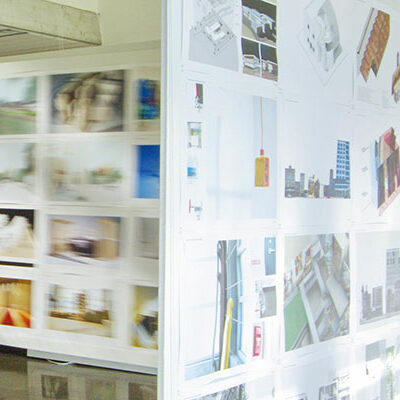We offer a variety of assistance as you launch your career, including ways to build your professional network and refining the materials you use to apply for internships and permanent positions.
- While writing your resume, tailor it to the firm’s design sense and mission.
- Focus on being as direct and relevant as possible.
- Avoid phrases like “excellent work ethic”, “good communication skills” and “detail-oriented”.
The following link has several samples showing varying layout and includes suggestions on proper formatting and content:
Contact Sharadha Natraj for help with your resume.
- Use simple and direct language.
- Personalize each letter.
- Do not apologize for lack of experience.
- Focus on what you can bring to the job.
- Letters should be no longer than one page.
Contact Sharadha Natraj for help with your cover letter.
How to get started with the design and layout of your portfolio.
Portfolio Tutorials
Creating a Sample Portfolio
Contact Sharadha Natraj for help with your portfolio.
Architecture firms in the Milwaukee and Chicago area seek out students during the annual Interview Day. In addition, students can avail of the opportunity to participate in the School’s externship program. We receive announcements for positions from the area and from alumni located throughout the country on an ongoing basis, and share these with students.
Positions in Architecture and Planning
- Simplyhired, Indeed, Milwaukeejobs
- Careerbuilder
- Usajobs – include keyword “pathways” with search
- Circuit AECRE
- Websites of individual firms
- Websites of state and local governments
Planning
- American Planning Association
- APA regional chapter websites
- APA – Wisconsin Jobs Listing
- Planetizen
- Planning jobs posted by UC Berkeley
- Geturbanplanningjobs
- Firms that include urban planning services (Archinect)
- http://www.gjc.org/ (GIS Jobs Clearinghouse)
- Linkedin search “urban planning” and related terms; brings up search result “Jobs requiring urban planning skills”
Architecture
- Archinect
- AIA Career Center
- AIA state and local chapters
- Arkitectum
- Linkedin search “architectural intern” / “intern architect”
- UWM email addresses have a limited life after graduation. Remember to use an email address that will not bounce back because it becomes invalid.
- Use an email address that you will check often.
- Make sure that the subject line is clear and includes your name and intent, eg. Request for meeting : Jane Smith.
- Emails for the purpose of job searches are business correspondence. Use the same rules for grammar, punctuation and usage as you would for a cover letter.
- Keep it concise, with no repetition.
- While writing emails, be careful not to ask questions that are easily found online. Research before you ask.
- If you are including attachments, mention this in the email. It is often easy to overlook attachments if a person is rushed. Make sure you attach the file before sending.
- Read and follow instructions for emails carefully, if any are specified by the prospective employer.
- Email is not private! Imagine your email being read by everybody in the organization.
- Avoid the use of inspirational and religious quotes in your email signature when you are engaged in a job search.
- It is acceptable to write a cover letter in the body of the email. All guidelines for a professional cover letter will apply.
- Pay close attention to the tone of your email. Keep it professional. Save drafts and read again for tone before you hit the send button.
- Don’t use all caps or bold.
- Avoid sending emails from your phone. Autocorrect is unpredictable, and tone is hard to control when sending emails in a rush. Take your time to think and write out a complete response.
- Avoid using instant messaging abbreviations, excessive punctuation like question marks and exclamation points, and emojis.
- Avoid using decorative backgrounds and colored text. Simple is best.
- Leave the recipient’s address blank until you are ready to send the note. This will help you to avoid sending it before it is complete.
- Do not use only email for urgent messages such as getting directions to an interview or to inform the person you are meeting that you will be late. Make a phone call in case the person does not read their email.
- Respond to emails within 24 hours. If you need time to prepare materials being requested, it is good to respond and let the person know you will follow up soon.
- Only take necessary materials.
- Collect business cards of those you meet/interview with.
- Take along pen and business pad.
- Add reminders on top page, any questions you thought ahead of time, so you won’t forget it during the interview.
- Carry folders, not book bags.
- Do not carry in drinks.
- Make sure your cell phone is off.
- Be professional in demeanor, not cute.
- Research firm and dress policies.
- A tie is never wrong, provided you are comfortable in it.
- Dress comfortably. Don’t try a new style or new shoes on interview day. Make sure clothes are not too tight or short.
- Make sure shirts don’t crumple easily. Tuck in your shirt.
- Lower heels are always right.
- Focus on personal grooming.
- Be polite to all staff.
- Listen – think – respond.
- Be yourself and be sincere.
- Do not be overconfident.
- Think of the positive…don’t apologize for lack of experience.
- Use appropriate language. Even if the interviewer seems informal, use proper language and no profanities.
- Let them lead the interview.
- Don’t talk too fast.
- Remember: the people interviewing are experienced, so treat them with respect.
Interview Questions
- Why are you in this field?
- How do you see yourself in our firm?
- What are you looking for in a job/firm?
- What is your biggest skill?
- What are five things you want me to remember after this interview?
- What is your biggest weakness?
- What is important to you in a job?
- Where do you see yourself in five years?
- Who in the profession do you follow and admire for their ability and why? (both local and
international) - How do you distinguish yourself from others?
- If you had to choose one project to define yourself and which would represent yourself the
best, which one would it be? - What trends do you see in Milwaukee architecture/urban planning and what are your thoughts
on it? - What is your best non-architectural skill that helps you in architecture?
- Tell me about something you built with your own hands?
- Describe a situation where you have made design tradeoff decisions?
Questions you should ask
- What are the short-term expectations? What will I be working on?
- What is the job environment/structure?
- Does the organization provide support for professional development?
- Does the organization provide support for pro bono work?
- Make sure your questions are thoughtful and relevant.
- Set a “hook”. Tie in a key, unique event or something you have done that makes a difference in your work.
Useful resources to prepare for questions
For current local trends in planning and design:
- jsonline.com
- onmilwaukee.com
- urbanmilwaukee.com
- The Business Journal
- http://www.lifeofanarchitect.com/winning-interview-techniques-for-architects/
After the interview
Other online resources
Worst things to wear for a job interview
Interview questions and how to prepare
The Perfect Job Interview in Eight Simple Steps
Archinect: how to negotiate for the position you really want
- Meeting people and establishing professional relationships is much the same as personal life. It takes time and effort to build a rapport and a connection that will last.
- Networking skills need to be cultivated and practiced. Anyone can be a good networker! All you need is ONE connection to start with.
- Do you have a professor or member of the staff you have a good relationship with? Ask them to put you in touch with professionals in the field.
- Attend events, lectures, workshops, Lunch and Learns. The School conducts several of these over the course of the academic year, and AIA Milwaukee has an uptodate listing of events around town.
- Introverted? Take a friend along. You will feel more comfortable, and have more confidence to introduce yourself to strangers.
- If you have a conversation with someone and you think you would like to continue it, ask for their business card or email address. Follow up and re-introduce yourself, eg. “I met you at… and enjoyed our conversation. I wondered if it might be possible to get a tour of your firm?”
- Follow up a personal meeting with a Linkedin invitation.
- READ! There are several journals in the Resource Center that address design and practice issues. Learn about what is going on in the profession today, so you can form thoughtful questions to ask and have a professional conversation.
Formerly referred to as IDP, students are encouraged to participate in the NCARB Architectural Experience Program (AXP) as part of the path to licensure. It is also possible to take the Architect Registration Exam (ARE) while you are still completing in the AXP program. ARE pass rates are collected here by date and institution.
SARUP’s AXP advisor is Professor Brian Schermer.


